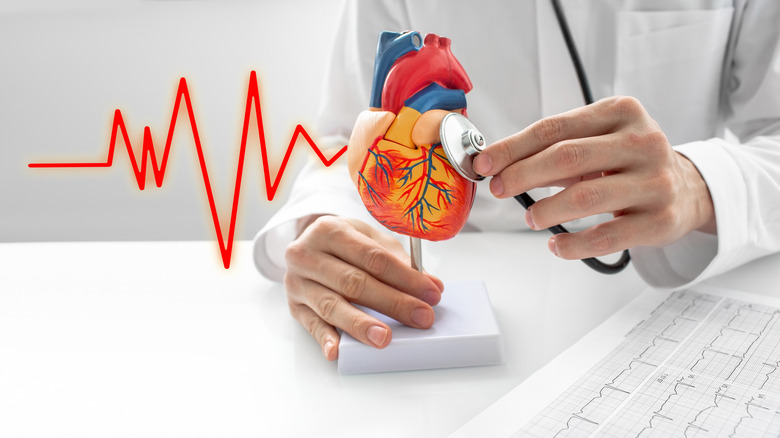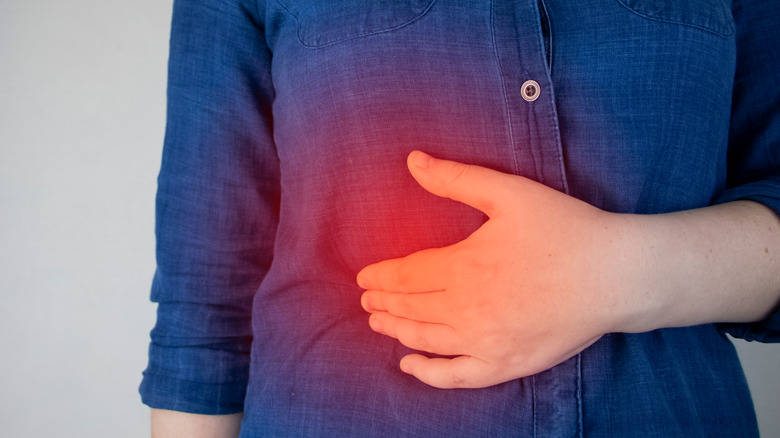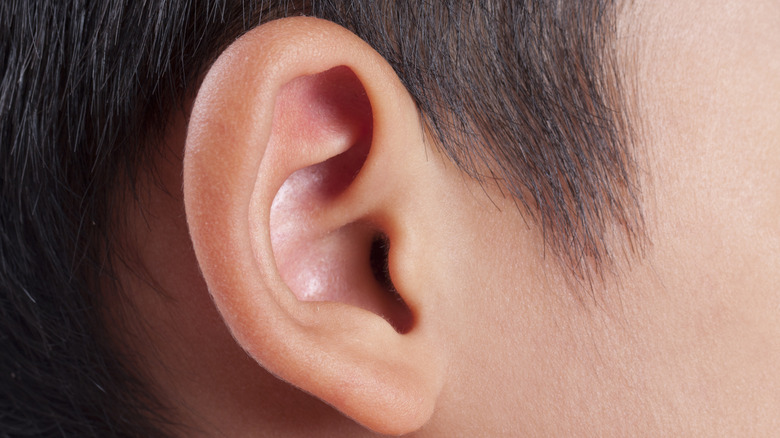Things You Never Realized Were Making You Nauseous
Uh oh. Someone grab a bucket. The feeling of nausea –- that sensation in your stomach where you know any minute now, you might have to find a place to vomit fast –- is one of the most uncomfortable we experience. Nausea is part of our body's natural regulatory system, indicating illness, as family medicine physician for the Mayo Clinic Health System Jayme Hoch states to Prevention.
The problem is, nausea can be triggered by a lot of things. While we typically assume that queasy feeling in our tummies is a result of something we ate or a stomach bug (per Everyday Health), as Hoch states, it's actually "a very general symptom that can occur in a wide variety of illnesses." As a result, it can often be difficult to pinpoint exactly why we're feeling so rough. And if you find that you're experiencing nausea more often than usual, there's a huge range of causes that you may have never thought about. At Health Digest, we wanted to settle your stomachs once and for all –- so join us as we take a look at some things you never realized were making you nauseous.
Stress and anxiety are huge triggers of nausea
Stress is everywhere. Approximately three-quarters of U.S. adults experience symptoms of stress every month (per the American Psychological Association), and 31.1% of Americans experience occurrences of anxiety disorders at points in their lifetime, according to the National Institute of Mental Health. And although these conditions –- and the symptoms we tend to first recognize for them — are primarily mental, they have a profound effect on our physical state too.
In fact, nausea is one of the most common signs that you're experiencing stress or anxiety, states Medical News Today. This is all down to how our body responds to conditions of stress, treating it as a perceived threat and releasing neurotransmitters that prepare the body for the "fight or flight" response (via Verywell Health). These neurotransmitters can then make their way to our stomachs and disbalance our gut microbiome, which then results in nausea. The stress response can also cause other gastrointestinal symptoms like constipation, diarrhea, and stomach cramps.
When it comes to nausea caused by stress or anxiety, the best way to treat it is to start by addressing the cause itself. Lifestyle changes like finding time to relax or limiting substances that can result in heightened anxiety (like alcohol or caffeine, as Medical News Today points out) can be a good move. If you're experiencing persistent symptoms of stress or anxiety, discussing it with a medical professional can help.
Low blood sugar can cause nausea
Sometimes, nausea can be caused not by something you ate, but something you didn't. One surprising cause of nausea can be the fact that you're experiencing hypoglycemia, or low blood sugar, according to Verywell Health. When our blood sugar dips, even into mild levels, our bodies respond by shifting to fight or flight mode, and releasing adrenaline (via Hormone Health Network). The function of the adrenaline is to move the stored glucose in our muscles into our blood, replacing the blood sugar and restoring it to balance. But in doing this, it can also cause feelings of nausea, as well as shakiness or anxiety (why is partly why you feel so stressed when you're hungry).
For people with diabetes, nausea due to low blood sugar can be caused by other factors. Certain medications like metformin, liraglutide, pramlintide, and insulin glargine — all used to treat diabetes and symptoms of the condition — can cause nausea as a side effect (per Verywell Health). Diabetes can also cause a higher incidence of other conditions like pancreatitis or gastroparesis, both of which have nausea as symptoms (via Healthline and Mayo Clinic). If you're experiencing persistent nausea while taking medication or when your blood sugar seems normal, discuss your options with your doctor. They may be able to prescribe you a different medicine, or to investigate further.
Morning sickness isn't the only type of nausea during pregnancy
Morning sickness is one of the tell-tale signs of early pregnancy (via Mayo Clinic), but nausea occurring at other parts of the day can also be an indicator that you might be expecting. A lesser-known occurrence of nausea during pregnancy is after you eat, according to What To Expect. Although it's not fully clear yet why some pregnant people experience nausea after eating their lunch or dinner, it could be down to the effects it has on their already-heightened levels of human chorionic gonadotropin (or HCG), a hormone that supports the embryo formation and is particularly high during your first trimester (via Hormone Health Network). Additionally, "the rise of estrogen or the change in the balance of the bacteria in the gut during pregnancy could be another reason nausea after eating increases," states internist and gastroenterologist Niket Sonpal to Insider.
Managing nausea during pregnancy can be tricky, but it can be useful to prioritize foods that are easier to digest like bananas, rice, or toast, and to keep on top of fluid levels, as the Mayo Clinic advises. More profound nausea symptoms (particularly for morning sickness) can be treated with a vitamin B6 supplement or anti-nausea medications prescribed by your doctor.
Nausea could be a sign of heart disease, or even a heart attack
Conditions that primarily affect one part of the body can show signs elsewhere, and this is especially the case with heart disease. Heart disease (the term used to encompass a group of medical conditions related to the heart, including arrhythmia, congenital heart defects, coronary artery disease, or heart failure, among others, per Healthline) can be a cause of nausea and vomiting. According to Healthline, it's more common for women than men to experience nausea as a sign of heart disease. Other symptoms can include dizziness, fainting, or back or jaw pain –- all common symptoms for other illnesses that can make identifying the cause as heart disease specifically difficult.
Not only that, but nausea can also be a symptom of more dangerous, urgent heart problems. Nausea and vomiting can be a symptom of a heart attack, says WebMD, and in this instance is also more common in women than it is in men. It may be the case that if you're having a heart attack, you'll know through other more common symptoms, like pain in the arm or chest discomfort. Particularly if you're at risk for heart problems, it's vital to contact health services immediately if you're experiencing any of these symptoms that may indicate a life-threatening condition.
Are you dehydrated?
If you haven't drunk enough water today, you could be finding out in a pretty unpleasant way. Nausea can be a lesser-known symptom of dehydration, which we typically associate with a dry mouth and feelings of thirst (via Prevention). This is all due to the body reprioritizing where the fluids go in your body when you're parched, says family medicine physician Jayme Hoch to Prevention: "When you have less fluid circulating in your body, your body preferentially sends that fluid and your blood flow to the organs it sees as most important — your brain and your heart," says Hoch. As a result of this, you end up with "decreased blood flow to the organs of your gastrointestinal tract," Hoch states, "causing nausea and abdominal pain."
The solution? A tried-and-tested method here, folks -– a glass of water. Remember, however, that your fluids need not just come from water or other drinks, as certain foods like cucumber, lettuce, watermelon, and other fruits and vegetables will also help you stay hydrated (per Medical News Today).
Your computer screen could be contributing to nausea
Do you feel a little worse for wear after finishing a day of office work? It may not just be because you're dreading the long commute home during rush hour –- your computer screen might have something to do with it, too. One little-known cause of nausea is a condition known as cybersickness, a sickly feeling that can occur after using screens for longer periods, which can cause disorientation and feelings of queasiness, states Healthline.
According to Christina Finn, New York Institute of Technology's assistant professor of occupational therapy, it's all down to the difference between movement in our heads and our bodies (via Real Simple). When using a laptop, tablet, or smartphone, says Finn, "your eyes may detect movement on the screen while your body remains stationary, setting up a conflict that can cause similar feelings of motion sickness," such as nausea. And much as with motion sickness, people are affected by this disorienting feeling on a scale of severity, with some people experiencing cybersickness in quite an extreme way, and others not feeling it at all, according to Healthline. Avoiding using multiple screens at once, taking frequent breaks from screens to rest your eyes and move, and reducing the overall time spent on screens can all help to reduce symptoms of nausea.
Feeling sick can be a sign of pancreatitis
While nausea can be a symptom of mild illness, it can also indicate something way more serious. Feeling nauseous could mean that you're experiencing an inflammation of the pancreas, also known as pancreatitis, on either an acute or chronic level (per the Mayo Clinic). Acute pancreatitis occurs when digestive enzymes activate while still within your pancreas, causing the organ to inflame. This can occur as a result of alcoholism, intake of certain medicines, gallstones, and several other health conditions. In addition to feeling nauseous, people experiencing acute pancreatitis may often feel pain in their upper abdomen or back, or have a fever.
While acute pancreatitis can get better with treatment, severe acute pancreatitis can be incredibly dangerous –- and repeated incidences of it can lead to chronic pancreatitis, when the pancreas is continually affected by trapped enzymes, causing damage over time, according to Cedars-Sinai. As with acute pancreatitis, nausea and vomiting can be telltale symptoms of the chronic condition.
Nausea can be a symptom of GERD
We all know the burning, uncomfortable sensation that can occur after we eat too many spicy treats or have just one more beer for the road, and sometimes the acid reflux that causes it can persist and result in gastroesophageal reflux disease, or GERD (per Mayo Clinic). But heartburn isn't the only symptom of GERD. Nausea can also be a sign that you're experiencing the condition, and can be caused as a result of the disruption to your regular digestive activity, as well as the potentially sour taste of the stomach acid coming back through your digestive tract and up to your throat, states Healthline.
The good news is, there are measures you can take both to help manage GERD and the nausea that may come with it. The first place to start is with your diet, trying to minimize intake of foods which can be particularly triggering to gastrointestinal upset, like alcohol, greasy or fatty foods, spicy foods, coffee and other caffeinated drinks, and high-acidity foods. Eating smaller, more frequent meals can also reduce acid reflux (and therefore nausea).
Medication on an empty stomach can leave you feeling queasy
As with many things in life, the things we do to make us feel better can sometimes have us feeling worse in certain ways. Such is the case with taking certain medications, which can sometimes cause nausea –- particularly if you're taking your medicine on an empty stomach (via Prevention). "Nausea is a common side effect of many different medications," states family medicine physician Jayme Hoch to Prevention. In fact, the types of medication that can cause nausea are not only wide-ranging but widely used. As Hoch states, these can include "antidepressants, blood pressure medications, oral contraceptives, pain medications, antibiotics, and many more."
If your medication doesn't have any specific advice about when or how it's best to take it, it's advisable to try taking it with food if you notice yourself feeling queasy after taking your pills. Unfortunately, though, some medications are best taken on an empty stomach. As Richard Klasco, M.D., says via The New York Times, this is the case with certain anti-osteoporosis drugs, as well as the HIV medication Sustiva. So, if you're experiencing nausea but you're taking your medication as instructed, or need to take it on an empty stomach, your doctor may be able to advise how to reduce sickly symptoms.
Is your air freshener to blame?
Air fresheners and scented candles are meant to be products that improve our lives –- but what if they did precisely the opposite by making us feel sick? Aside from some air fresheners smelling, let's face it, downright nasty, for some people they can cause full-on nausea, according to a study published in Preventive Medicine Reports. The study looked at over 1,000 individuals' responses to scented products. It found that not only did a third of participants experience health problems like asthma attacks and migraine headaches in response to scented products, but it found that 3.3% of people reported gastrointestinal issues after smelling various scents from air fresheners, deodorants, cleaning supplies, or household products.
High sensitivity and symptoms of sickness in response to smells is formally known as hyperosmia, and people who have more serious occurrences of the condition can sometimes have an extremely strong reaction to smells, according to Verywell Health. Our sensitivity to scents can also vary at different points in our lives, such as during pregnancy, or even as a sign of a vitamin B12 deficiency.
Drinking coffee before you eat will upset your stomach
Ah, the first sip of your morning coffee. It just hits different, doesn't it? You might want to make sure you're having something to eat with it, though. If you're feeling a bit ill after a cup of Joe, it could be because you're drinking it on an empty stomach (via Bustle). This is down to several elements of what makes coffee so delicious and invigorating, the first being its acidity, according to professor of nutrition and registered dietitian Trina Best. According to Best, coffee's pH level sits roughly between 4.5 to 5.5, and when this acid hits your stomach without any food to cushion it, it can result in nasty gastrointestinal symptoms and nausea.
There's also the fact that coffee is caffeinated. While this naturally makes it manna from heaven first thing in the morning, this caffeine ends up stimulating each place it reaches, and as registered dietitian Diana Gariglio-Clelland says to Bustle, "stimulating the stomach, especially when it's empty and can quickly absorb the caffeine, can cause nausea." For certain people, additions like milk or sweeteners can also add to a nauseous feeling. To try and minimize feeling rough when you have your coffee, eat something with a little protein like yogurt, cheese, or eggs, recommends Gariglio-Clelland. These slow-to-digest foods will help your body stay free of nausea.
Nausea can result from being hungry
When was the last time you ate? If you're feeling a little sick, it might be the moment to ask yourself that question. Somewhat oddly, simply being hungry can be enough to cause nausea in some folks instead of, or in addition to, just feeling traditional hunger pangs (via Live Science). This is due to hormonal releases and changes in stomach contents that occur throughout our body to try and get us to eat, states Christine Lee, a gastroenterologist at Cleveland Clinic. When we haven't eaten for a while, our stomachs contain a build-up of hydrochloric acid, which acts to digest food. This build-up can then "[slosh] up into the esophagus," states Lee to Live Science, where "it can cause acid reflux, heartburn and nausea."
To add to this, our levels of ghrelin and leptin, two hormones that usually work in harmony to regulate hunger levels and control the healthy intake of food, can sometimes become unbalanced when we don't eat enough. In certain people who "have higher sensitivities to hormonal levels," says Lee, this can cause added nausea. Lee is keen to point out that feelings of nausea when hungry could also be a sign of metabolic syndrome, which can increase the risk of developing heart disease (per Mayo Clinic) –- so if you're feeling nausea regularly when hungry, it's important to be aware of this.
You could have an inner ear infection
Have you noticed a bit of a sickly feeling accompanied by a ringing in your ear? That nausea, combined with other symptoms like tinnitus or earache, could be a sign of an inner ear infection, according to Medicine Net. Inner ear infections are commonly caused by the inflammation of the inner ear, which operates our hearing and assists in balance -– which is why a key symptom of an inner ear infection may include dizziness or issues with balancing or walking. It's this dizziness and disorientation that can lead to a feeling of nausea and vomiting.
While most inner ear infections will clear up with treatment pretty quickly, some other inner ear conditions can cause continual issues and feelings of queasiness. Meniere's disease, for example, is a chronic inner ear disorder typically affecting one ear, and it can cause bouts of vertigo and dizziness, as well as nausea (per Healthline). The condition is most likely to affect people in the middle stages of their life (their 40's and 50's). While vertigo is the primary defining condition for Meniere's disease, experiencing repeated bouts of dizziness with accompanying nausea could be a sign to get your ears checked.
You could have a food allergy or intolerance
Sometimes feeling sick really is just about what you've eaten. But before you assume food poisoning and hunker down with a hot water bottle, bear in mind that nausea can be caused by a huge range of food allergies or intolerances -– and they may be so subtle that you may not even know you have one (via the Cleveland Clinic). Food allergies and intolerances are seriously common, with lactose intolerance affecting around 10% of Americans. But allergies and intolerances can manifest in milder symptoms, and may only become obvious when you notice you experience nausea consistently following a particular food.
So, if you're feeling nauseous now and again after a meal but you're not sure why, it's worth turning your eye to your diet. Keeping a food diary and recording your meals and any bodily symptoms may help you identify trends. Milk, nuts, fish, eggs, and shellfish are all common allergies, as the Cleveland Clinic states, whereas common food intolerances include gluten, caffeine, dairy, sulfites, and fructose, says Healthline. Reducing a certain food in your diet can help you stave off those nauseous feelings long-term.















